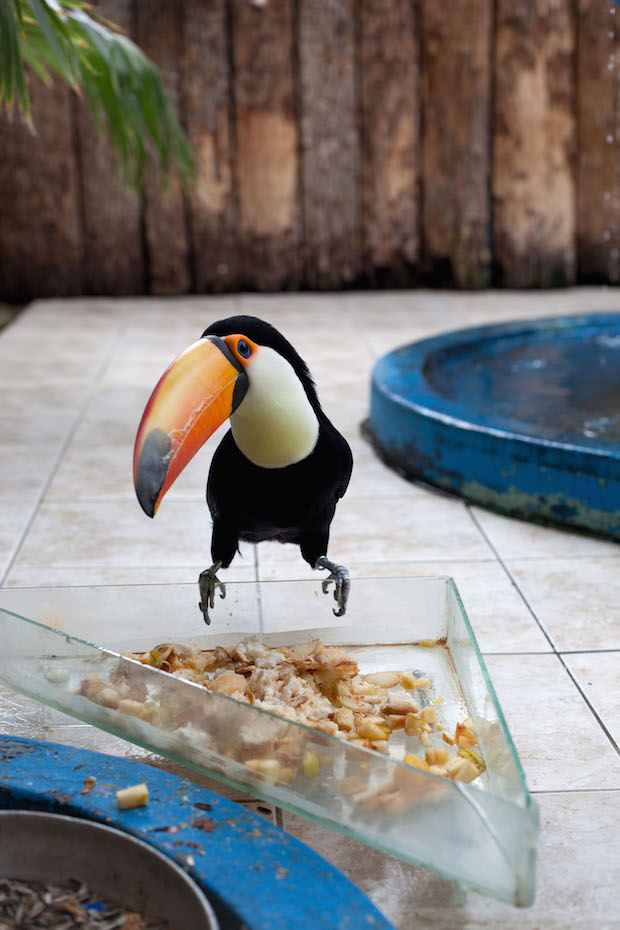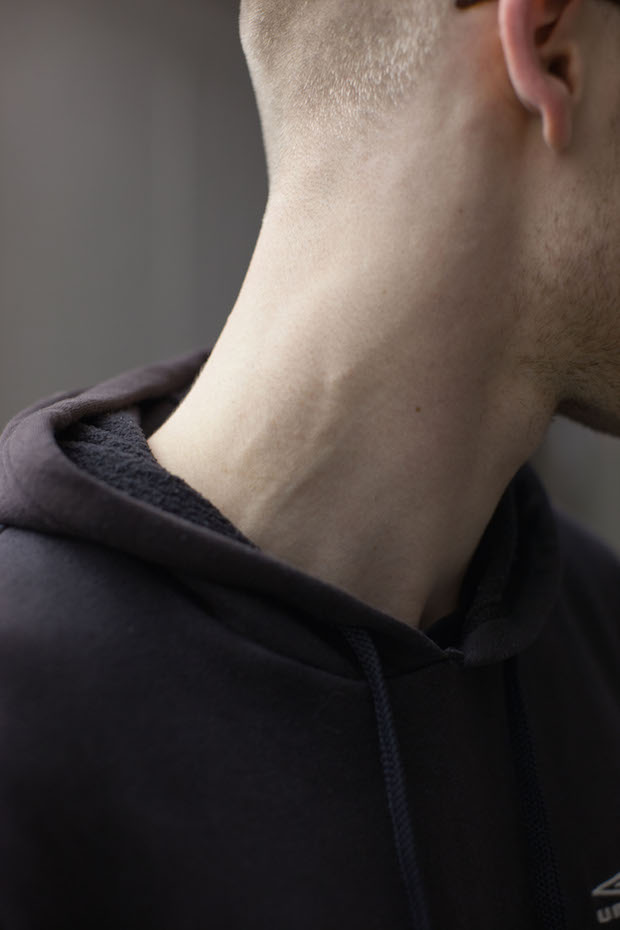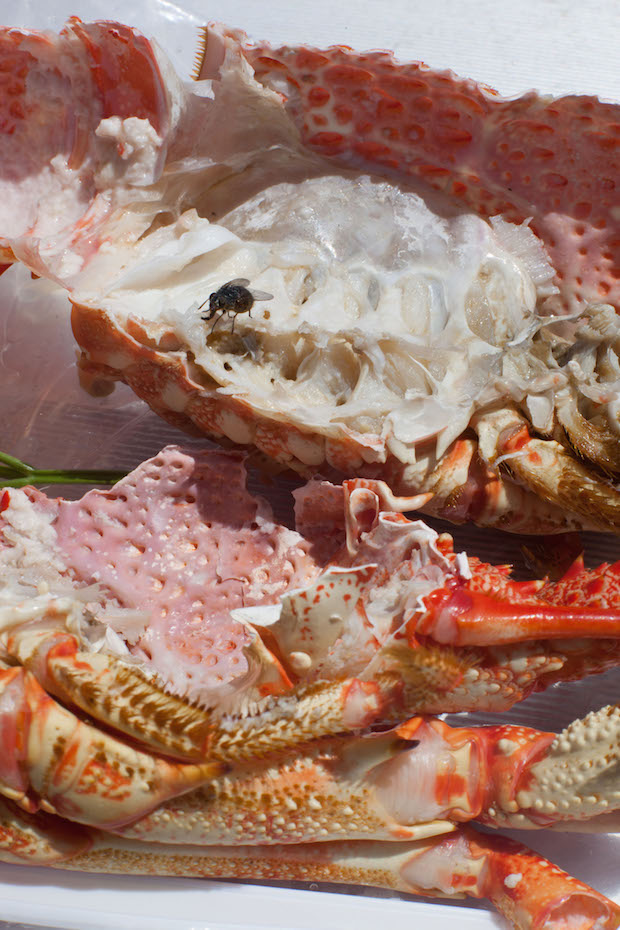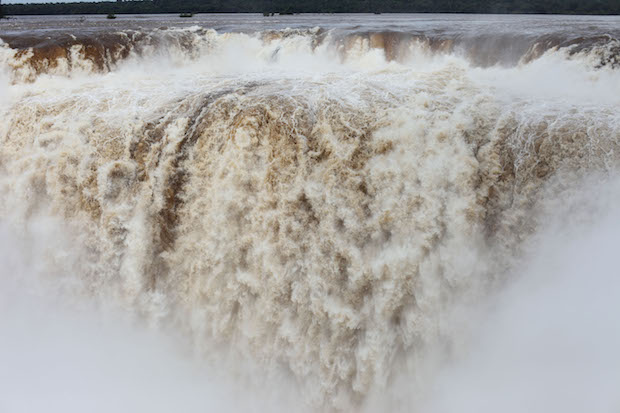Presenting his photographs unframed, held simply to the walls with bulldog clips, has become something of a signature for the German-born artist Wolfgang Tillmans. Nonetheless, it’s disconcerting to encounter these thin, unprotected photographic sheets alongside framed works in his current solo exhibition at Tate Modern (until 11 June). The exposed objects seem both overtly vulnerable and quietly assertive, proclaiming their own out-of-placeness in such a high-profile show in the UK’s most-visited museum of modern art.
A similar disregard for institutional norms is expressed in the absence of any informative captions or wall texts (save for minimal ‘tombstone’ labels) as well as the non-chronological exhibition installation and, of course, the work itself, which refuses to be contained by the boundaries of fine art. Tillmans’ many collaborations are highlighted, including his work with the legendary Berlin nightclub Berghain and i-D and Vice magazines; sculptural, abstract photographic prints and diverse images depicting the modern world freely commingle with music, journalism, design, and political activism. An experimental energy fizzes through the galleries and an aura of cool emanates. But when I meet Tillmans on the eve of the opening, it’s his warmth and sincerity that strike me – personal qualities that, it becomes clear, also lie at the core of his art and exhibition-making.

Tukan (2010), Wolfgang Tillmans. © Wolfgang Tillmans
Tillmans cheerfully tells me that he has been working ‘for two weeks, day and night’ on the exhibition, overseeing every detail from layout to lighting. Despite his use of other forms of presentation, such as books and public posters, for Tillmans the exhibition remains a uniquely ‘special’ space for displaying art. ‘It allows me to be with the work and see it close up. I think that’s what I always have loved about art; as a teenager I fell in love with the presence of it… its “aura”.’
It’s surprising to hear Tillmans proclaim a faith in art’s auratic presence. The notion seems at odds both with his primary medium, the re-printable photograph, and the deconstructive mind-set of most contemporary liberal thought, with its scepticism towards the idea of ‘natural’ or absolute truths within society. Indeed, Tillmans’s own work is frequently preoccupied with questions of the truth, most overtly in his on-going truth study center project (2005–present), the most recent iteration of which was created for his Tate exhibition. Copies of the artist’s photographs are laid out on tables, juxtaposed with articles, drawings and objects that repeatedly highlight the constructed, partisan nature of many of our perceptions and beliefs. Another ongoing series composed of Tillmans’s abstract prints made without a camera seems to make the same point in a subtler manner, tricking the eye into believing that the images represent something real, as opposed to the darkroom processes they trace.
Tillmans, however, balks at the suggestion that his work seeks to undermine the idea of truth. ‘I am not a relativist. There are certain truths that I find are non-negotiable, like the earth orbiting the sun, and – maybe this is more disputable or more disputed, but for me undisputable – that all men are born equal. That is the starting point for my life, and my art-making. I must remind myself that everything I want for myself, I have to allow others to want that.’

Collum (2011), Wolfgang Tillmans. © Wolfgang Tillmans
To profess a belief in equality may not seem like a very politically charged statement, but in reality Tillmans is one of the most socially engaged mainstream artists working today. Over the past few years he has actively involved himself in the causes he believes in, however polarising, from his journalistic work profiling Russia’s threatened LGBT+ community to his high-profile campaign as one of the few truly passionate advocates for the European Union in the months leading up to the June 2016 EU referendum in the UK. Tillmans designed and produced posters and t-shirts, combining images with a series of emotive statements drawing on the artist’s own experiences as part of a ‘European family’, as a London and Berlin-based artist born and raised in Germany to Polish and Spanish parents. When asked why he committed so publicly and wholly to the anti-Brexit campaign, Tillmans replies without hesitation: ‘That was just completely driven by the urgency of what I thought was a dangerous thing, happening at the wrong time in the wrong place.’
The same inclusiveness, a desire to override conflict and division, governs Tillmans’s approach to making art. When I ask him which artist at Tate Modern he feels most connected to, he cites Robert Rauschenberg, currently subject of a solo show (until 2 April) in the galleries opposite Tillmans’ exhibition. ‘His work has been influential to me in celebrating and reflecting the simultaneity of things of different magnitude, and supposed importance, in his collages and juxtapositions.’

astro crusto, a (2012), Wolfgang Tillmans. © Wolfgang Tillmans
Notions of simultaneity and equivalence are repeatedly emphasised throughout Tillmans’ exhibition. There’s the magnificent Playback Room, a high-tech space designed for listening to music at studio quality, which proposes that sound deserves the same level of care and attention as the visual arts. And of course there are the photographic images presented in a wide variety of scales and formats, and depicting all aspects of contemporary life, from large-scale close-ups of weeds in soil, car headlights, and genitalia, to panoramic views of waves, waterfalls, and the star-lit sky.

Iguazu (2010), Wolfgang Tillmans. © Wolfgang Tillmans
There is something deeply affecting about this gathering of photographs depicting moments that are alternately mundane, ecstatic, dark, or unabashedly beautiful – as if the works are indeed issuing a moral imperative to remember that everything we might want for ourselves, all care and attention, we have to allow others to want as well. Nonetheless, Tillmans emphasises the distinction between his art and products of activism such as the pro-EU posters, which clearly convey a specific message: ‘I didn’t see them as art’. What’s the difference then? ‘I like to say that art is useless… and that is of course its enormous power and strength.’
‘Wolfgang Tillmans: 2017’ is at Tate Modern, London, until 11 June.














![Masterpiece [Re]discovery 2022. Photo: Ben Fisher Photography, courtesy of Masterpiece London](http://zephr.apollo-magazine.com/wp-content/uploads/2022/07/MPL2022_4263.jpg)
‘Like landscape, his objects seem to breathe’: Gordon Baldwin (1932–2025)